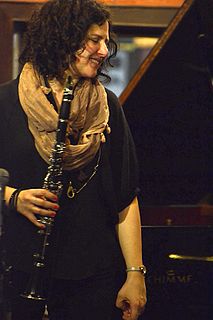Top 41 Quotes & Sayings by Anat Cohen
Explore popular quotes and sayings by an American musician Anat Cohen.
Last updated on April 14, 2025.
There's always this joke that I say in Israel: people don't really have discussions; they just try to convince the other people that they are wrong or they are right - they just try to impose their opinion on the others. Sometimes I think it's easier to avoid talking about things and just make music.
Boston was incredible. I had some of the best experiences of my life there at Berklee because I met a bunch of other people who were at the exact same stage in life and interest as me. There were American and international students all wrapped up in the Berklee environment, where you basically did nothing but music 24/7.




















